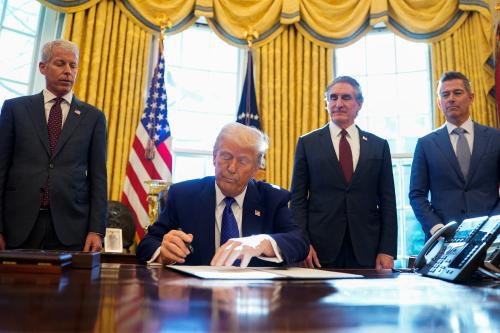This is a Brookings Center on Regulation and Markets working paper.
Executive Summary
Firms traditionally employ a variety of strategies to gain an economic advantage, including typical market actions, such as offering a superior product to their competitors or innovating more rapidly. At the same time, firms can also employ non-market actions to reap economic benefits, a strategy that involves engaging with various non-market actors such as regulators, political actors, non-government organizations (NGOs), media agencies, and advocacy groups. For instance, firms can raise costs for competitors through the use of non-market actors by lobbying for protective trade policies to impede foreign competition, or by attempting to influence government actors to establish regulations that restrict entry and limit competition.
One underexplored, but important way firms can engage with non-market actors strategically is to directly attack target firms. When conceptualizing non-market strategy primarily as a three-party game, including an attacking firm, a target firm, and a non-market actor, the role of the non-market actor changes from the primary target of a firm’s non-market efforts into a strategic “weapon” that allows an attacking firm to inflict damage on another firm and undermine its standing in the market environment. Real-world examples for such behavior are plentiful and can be found in a variety of settings and industries. For instance, firms regularly engage in attempts to influence political actors to block proposed mergers of their competitors, and activist investors attack firms by using strikingly similar tactics as the ones deployed in political campaigns. The three-way interactions (i.e., between two firms through a non-market actor), however, are not limited to direct competitors in the same industry; they can also occur more generally between activist investors and firms, companies and their suppliers, or firms and their employees (e.g., through union groups).
In this paper, we characterize a representative case of such a non-market attack by conducting an event study of a campaign by Pershing Square Capital Management (PSCM), a hedge fund, against Herbalife, a dietary supplement company. The case study of PSCM and Herbalife demonstrates the potential for firms to use non-market actors to gain an economic advantage. PSCM initially took a $1 billion short position in Herbalife stock in 2012 and then embarked on a comprehensive effort to decrease the value of Herbalife’s stock by strategically engaging with a variety of non-market actors to attack Herbalife. As we are able to identify specific dates for the non-market attacks on Herbalife by PSCM, we can test whether these attacks were successful in generating negative abnormal returns for Herbalife’s stock by using a standard event study approach. This unique empirical setting, therefore, allows us to directly identify the negative effects of PSCM’s attacks on Herbalife’s financial performance through the use of non-market actors and determine the resulting performance gains for PSCM. We estimate the effect of PSCM’s non-market attacks on Herbalife’s stock price and find that they have significant detrimental effects. Moreover, our results suggest that the advantages enjoyed by the attacking firm exhibit a first-mover effect in the influence game on non-market actors, as it becomes more difficult for the target firm to influence non-market actors to its benefit over time.
Download the full working paper here.
Dylan Minor is founder, chief strategist and CIO for Omega Financial Group and is CIO for Argos Global Advisors. The authors did not receive financial support from any firm or person for this article or from any firm or person with a financial or political interest in this article. The authors are not currently an officer, director, or board member of any organization with a financial or political interest in this article.
The Brookings Institution is financed through the support of a diverse array of foundations, corporations, governments, individuals, as well as an endowment. A list of donors can be found in our annual reports published online here. The findings, interpretations, and conclusions in this report are solely those of its author(s) and are not influenced by any donation.
The Brookings Institution is committed to quality, independence, and impact.
We are supported by a diverse array of funders. In line with our values and policies, each Brookings publication represents the sole views of its author(s).






